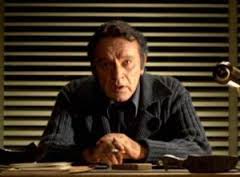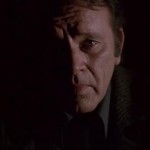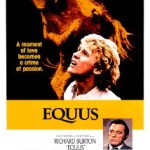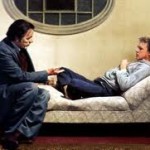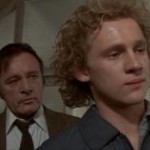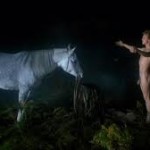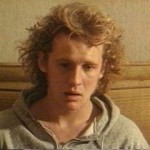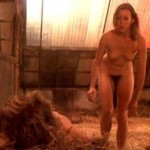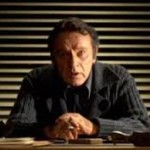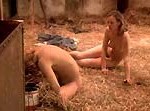“Passion, you see, can be destroyed by a doctor. It cannot be created” – Dr Martin Dysart in Equus
When I first saw Equus the movie (saw it on stage much, much later), I was about 17, had already read the play but was still stunned by its power; I mean, my jaw hit the floor. At once disturbing yet moving to the core ad with a message to humanity (see anon.) It has also not lost its power to shock – as when Daniel Radcliffe performed the role of Alan Strang, made famous here by Peter Firth, on stage in London – though how far that was caused by the thought of Harry Potter appearing naked on stage I’ll leave to your imagination.
But then how could Equus, the movie, go wrong: the estimable and distinguished Sidney Lumet directing and a formidable cast headed by the megastar that was Richard Burton, also including great character actors like Joan Plowright, Harry Andrews, Eileen Atkins, Colin Blakely, Jenny Agutter (many a man’s wet dream of an actress) and, of course, Firth.
This is a timely reminder of the depth of British acting talent, but also of the high spots. As an actor, Burton’s death might have opened the way to others, but also left a gaping hole in the acting firmament. He was more than talented, he was the closest to genius I’ve seen, and trust me I’ve seen a few. Alas, I never saw the great man live on stage, but I can imagine the whirlwind he might have summoned up in later life as, say, Lear. In terms of depth and resonance, this is acting like few others can summon up from the depths of human experience.
But best of all, the script, adapted from the stage version, was written by the legendary Peter Schaffer, he of Amadeus fame. The quality behind this movie is undeniably tiptop. The controversy at the time was more about two aspects of the play: the nudity and the savagery in which six horses are blinded. To the pro-censorship lobby of the blue-rinse Mary Whitehouse generation the very thought of such atrocities was beyond the pale, not that they ever took the trouble to check out the context, assuming perhaps that sensationalist headlines were the intention. Wrong wrong wrong: the nudity and the viciousness of the acts recreated are totally essential to the plot, which would be nothing like as powerful without them.
Other critics made a much wiser point, that where the stage play is heavily stylised, including metal horse heads that paved the way for those famed in stage productions of War Horse, the movie is placed in a more realistic setting. Point well made, though for a cinema audience it is vital to the integrity and dramatic intensity of the piece that the audience genuinely believes real horses are being blinded with an iron spike – though of course there is a notice in the credits that no animals were harmed in the making of this movie. It goes without saying that Spielberg’s movie of War Horse took exactly the same approach, simply because no other way would have worked.
However, some of the manifestations of staginess remain, though as I mentioned recently in my comments about Sleuth, I don’t think it is necessarily a bad thing, though I accept others will find the stylisation remains and sits uneasily with the modified realism of a stage play opened out into the real world.
But the real point of Equus is Schaffer’s hypothesis that we all need to worship and feel passion: that denied of religion, man needs to create a belief system of his own. In the case of the disturbed stable boy Alan Strang (Firth), Burton’s psychiatrist Martin Dysart takes the forensic plunge into the boy’s psyche and comes face to face with a god by the name of Equus: the power of the mythical horse.
As he gets closer to unravelling Strang’s demons, Dysart is increasingly confronted by the failures of his own inner self. As a plot outline this sounds way too simplistic to achieve the dramatic power, but trust me it does, for which thanks must go to Schaffer for a gloriously pungent script, one that ratchets up the tension to a degree few could match, and, of course, Burton.
Burton might have been a seriously flawed human being, but as an actor he was right up there with the very best of his generation and of the Century – even if he did not always use his gifts wisely. Few could match his screen presence, let alone the passion behind the words spoken in that rich, deep voice, a hint of the Valleys somewhere in the intonation.
But there is more, much more. A significant running theme through this movie is Dysart’s confessional, sitting at his desk looking directly at the camera, behind him inky blackness, his face lit to emphasise the impossibly impenetrable emotional blackness within, the Burton eyes burn deep into your soul.
“Afterward he says, they always embrace. The animal digs his sweaty brow into his cheek, and they stand in the dark for an hour, like a sated couple. And of all nonsensical things, I keep thinking about the horse, not the boy. The horse and what he might be trying to do. I keep seeing the huge head, kissing him with its chained mouth, nudging from the metal some desire absolutely irrelevant to fulfilling its bearing or propagating its own kind. What desire could this be? Not to stay a horse any longer, not to remain reigned up forever in those particular genetic strengths. Is it possible that at certain moments, we can not imagine, the horse can add its sufferings together, the nonstop jibs and jabs that are its daily life, and turn them into grief? What use is grief – to a horse. You see, I’m lost.”
As the camera slowly zooms in we are left with an indelible view of the bright side of Burton’s craggy face, the rest in shadow as he pleads, begs us to relieve him of his misery. The full force of his emotional desert hits you like a Saharan sandstorm. You are left numbed and breathless at Burton’s onslaught. It is gripping, compelling cinema, but also demonstrates supreme technique from the master – witness how still he remains on screen, an object lesson to younger pretenders.
Dysart’s jealousy, confessed to Atkins’s Hesther, is plain to see. He envies Strang Equus the god, and his act of worship.
“That’s what his stare has been saying to me all this time: ‘At least I galloped – when did you?'”
But for all that, the thesis on which Schaffer’s edifice is built does not convince me. He discounts secular humanism as a feasible option, indeed he emphasises the weakness of people we know and trust. They are pompous buffoons, self-important and mannered, not worthy of respect. Religion might be in many ways absurd, he tells us, but we need it to govern us. No, that is not fair – there is much more to it than that, but you need to listen to the arguments yourself and decide.
And in any case, does it matter against the strengths of Schaffer’s creation? I think not. We are human, we can make up our own minds. We can separate out our enjoyment of the movie from our views about his argument, which in turn tells us that unlike Strang and even Dysart, we are equipped to make decisions about our lives and to flourish in the process.
The film, for all its eloquence is dated visually and verbally. Where the text of Who’s Afraid Of Virginia Woolf remains relevant and up to the minute without betraying its 60s roots, Equus looks and sounds like a 70s landmark. Schaffer’s other masterpiece, Amadeus, also avoids this fate, so you wonder whether the writer intended this to be a work of homage, not reflective of the ever-evolving debate on the role of religion.
That apart, there is very much to admire about the whole construct, particularly if you were ever struck by the awe and majesty of horses, their patient uncomplaining dignity. What then could persuade Strang to take such a vicious action against animals he loved beyond all normal restraints of admiration, such that he could want to wear a bridle, bit and choker himself?
It is somewhat a movie of its time, slightly dated in a genteel way, not the adaptation that might be made in 2014, but nonetheless a brilliant piece of work.

